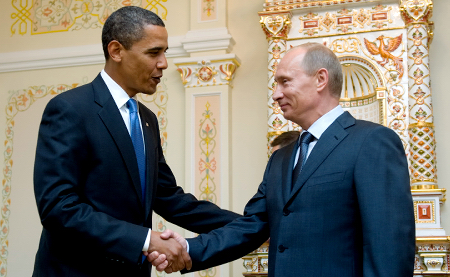
From Kurt Volker, the Christian Science Monitor: For the past several years, US and European policy has aimed largely at cooperating with the Russian government on key issues , while modulating criticism of the Kremlin’s political and human rights restrictions, and its heavy-handed pressure on neighboring countries.
This fact, however, has not stopped Putin, either as prime minister or as candidate for his old job, from turning up the anti-Western rhetoric and positioning his government as standing up to the West.
Actions include selling arms to Syria while blocking UN action, undercutting international sanctions on Iran, blocking NATO-Russia cooperation on missile defense, threatening new missile deployments aimed at Europe, and suggesting Russia could walk away from the START II Treaty on nuclear arms signed by President Obama and Medvedev.
Putin has even accused US Secretary of State Hillary Rodham Clinton of encouraging and funding the domestic protests in Russia. . . .
If the West were to persist with the reset, it would mean de-emphasizing criticism of Putinism, while Putin himself escalates attacks on domestic opponents and the West, and thwarts a responsible international security agenda. . . .
Putin has made clear that such a constructive relationship will not be possible.
It is of course conceivable that a re-elected Putin will morph into a reformer. But I wouldn’t count on it – and the West should be prepared to act determinedly upon the first signs that the old Putin is back.
With such a reality, the US and Europe should change course – still seeking to cooperate where possible, but taking a strong public stand against political corruption in Moscow, and in support of the legitimate aims of the Russian people, as expressed through a genuine democratic process. For example: Should Putin really be invited to a NATO-Russia Summit in Chicago in May? Or have a bilateral meeting with Mr. Obama?
Even if Putin does settle in for another dozen years, the Russian people need to know that democracies are on their side, and Putin himself needs to know that there are consequences if he persists in his old ways.
Kurt Volker, a former US ambassador to NATO, is a professor of practice at Arizona State University and a senior fellow at the Center for Transatlantic Relations and the Atlantic Council. A version of this article appeared in Handelsblatt (Germany). (photo: Loeb/Getty)
Image: ny%20daily%20news%203%205%2012%20Obama%20Putin.jpg
